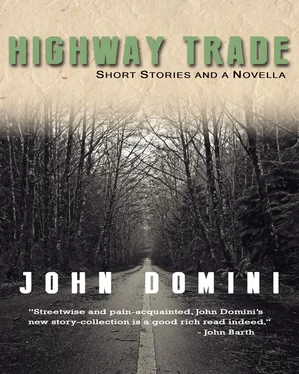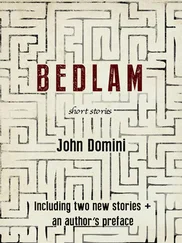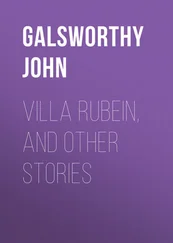John Domini - Highway Trade and Other Stories
Здесь есть возможность читать онлайн «John Domini - Highway Trade and Other Stories» весь текст электронной книги совершенно бесплатно (целиком полную версию без сокращений). В некоторых случаях можно слушать аудио, скачать через торрент в формате fb2 и присутствует краткое содержание. Год выпуска: 2013, Издательство: Dzanc Books, Жанр: Современная проза, на английском языке. Описание произведения, (предисловие) а так же отзывы посетителей доступны на портале библиотеки ЛибКат.
- Название:Highway Trade and Other Stories
- Автор:
- Издательство:Dzanc Books
- Жанр:
- Год:2013
- ISBN:нет данных
- Рейтинг книги:4 / 5. Голосов: 1
-
Избранное:Добавить в избранное
- Отзывы:
-
Ваша оценка:
- 80
- 1
- 2
- 3
- 4
- 5
Highway Trade and Other Stories: краткое содержание, описание и аннотация
Предлагаем к чтению аннотацию, описание, краткое содержание или предисловие (зависит от того, что написал сам автор книги «Highway Trade and Other Stories»). Если вы не нашли необходимую информацию о книге — напишите в комментариях, мы постараемся отыскать её.
Highway Trade and Other Stories — читать онлайн бесплатно полную книгу (весь текст) целиком
Ниже представлен текст книги, разбитый по страницам. Система сохранения места последней прочитанной страницы, позволяет с удобством читать онлайн бесплатно книгу «Highway Trade and Other Stories», без необходимости каждый раз заново искать на чём Вы остановились. Поставьте закладку, и сможете в любой момент перейти на страницу, на которой закончили чтение.
Интервал:
Закладка:
Sitnell wondered how many Kroh’d had. But then he must be feeling his gin already himself, the portfolio seemed to have the most raucous zipper he’d ever heard. Of course he hadn’t gone out drinking like this in, what, two-three years now.
“I mean Walter, just your sitting here tells me what I want to know. Just your sitting and looking at Hood. That tells me you’re a man who knows what he likes.”
Sitnell took a swallow that lifted his chin.
“I mean most guys, when they retire, they don’t go write a book.”
Sitnell undid his reversible, fitted on his bifocals, and frowned. Kroh never broke stride. Bent over the half-open portfolio, doing some preliminary fiddle and sort, he moved on to Sitnell’s taste in bars. “Those cowboys over by the TV, I love it. And the basketball sneakers nailed to the wall? Exciting. Tiger stripes even. And I’m not even talking about the posters with the prices, those great old Peter Arno champagne glasses. I mean when I saw those, I knew you and me could set this up.”
Peter Arno champagne glasses? But just a few days ago Sitnell’s editor, another New York type, had pulled the same stunt. He’d thrown around a lot of names Sitnell had never heard of, when what they’d been talking about after all was the title of Sitnell’s book. New York preferred catchy vagueness like Underbelly . Finally Sitnell had put his foot down. He’d said he hadn’t written the book in order to go on TV. It didn’t matter how they’d gussied up the jacket photograph, Sitnell had said: he was no Lorne Greene. The editor’s silence after that felt almost as good as the letter of acceptance. Except then Sitnell’s wife had used the same argument against him when he’d told her he was thinking of getting together with Kroh. First she’d repeated the awful stories about the man’s marriage. But when that had failed to change Sitnell’s mind, she’d asked him straight out: if he didn’t want any TV sort of publicity — if the truth of the book was what mattered — why was he meeting this guy?
Kroh slipped a couple samples of his work across the table. Sitnell raised his eyebrows, pouted approvingly. Talent had never been a question. At the hardware store where Sitnell shopped, over the cash register, they’d even glued a couple of Kroh’s cartoons together and hung them on fishing line from the ceiling. Nonetheless the publicist’s third sample took him by surprise. Sitnell had to cup his drink to his belly with one hand, pick at his hair with the other. Kroh had drawn a map of the U.S. in the form of hundreds of naked babies. The infants were crammed together coast to coast, often with just a part of the torso showing. Florida hung upside down, a bawling head and shoulders only, its hands trapped by the crush above it. New England was mostly a pair of kicking legs. And Cape Cod — Sitnell needed another long swallow — was the boy’s exposed genitals. He thought of the propaganda flyers dropped over his positions during the war. The piece was in black and white, but the wall of babies appeared to have all its natural suddenness and pudge.
“It’s for pro-choice.” Kroh threw back the last of his drink. “You know that—“
“I know the abortion people, yes, thank you. I live in the same century you do.”
And then the barmaid stood over them, awful timing. Worse, now that he’d got his glasses on, Sitnell could see that the girl was pregnant. Her belly rose almost to her pigtails. It was all Sitnell could do to keep from slapping his arms across the publicist’s latest piece, and he wound up taking a refill.
Kroh busily made peace. More one-liners, more of that eyewash about “most guys these days.” Sitnell wondered if back East this kind of shake-and-shimmy actually worked. Now the man was insisting that Sitnell call him Jimmy, making it into yet another nervous joke. “Out here Walter, whenever I call people, like trying for an assignment? They think I’m an Indian.” A very nervous joke: the guy patted his lips with a flat hand, woo-woo. “And then they think I’m dreaming , right? They think I’m trying to hide the fact that I’m an Indian by spelling it the way I do.”
But Sitnell cracked a grin at that, and Kroh followed up well. “I’m telling you, Walter. These days I’m death on the phone.”
And the second drink helped. The pricklier edges on the give and take got lost more easily in the country-and-western out of the speaker overhead. Sitnell even began to see the pattern in Kroh’s talk: first something pushy, then something apologetic. Even the gestures changed: first all knuckles, then a loose wrist. So after another one of those — while the younger man was still saying he was sorry and tugging at the tip of his jacket’s single lapel — Sitnell thought he understood why he’d come tonight.
He believed he’d pitied the man. It wasn’t only those renegade looks that made Sitnell think so. There were mill workers at the bar almost as dark as Kroh. Though they kept their caps pulled low (red Budweiser or white Cat), every time the cowboys looked this way you could see that a couple had Kroh’s Mongol eyes. No, it wasn’t just Kroh’s appearance. Also the man seemed to insist on putting something disagreeable in every piece he drew. And how was that supposed to help him do dust jackets? How was that supposed to help him do publicity at all? The poor misguided clod. Sitnell could even identify what the pity felt like, a booze-tinged seepage down the back of his neck. Interesting to pick it out so clearly. Sitnell began to fuss with his hair again, rotating his head shoulder to shoulder, in order to isolate the sensation better. Kroh was only whining anyway. He’d started to badmouth the Oregon Journal , which had folded under him after he’d moved “all the way out here” to take the job. Sitnell’s wife had told him as much already.
Besides, while turning his head he’d discovered there was another couple in the lounge. They had a table over by the restrooms. A businessman in a three-piece suit, almost Sitnell’s age, sat across from a redheaded girl in a full-length dress. Rather nightclubby for this place, though they weren’t getting the stares that Kroh had. Sitnell however peered over his bifocals. The couple had some brightly decorated box between them, a present perhaps.
“Yeah,” Kroh said. “Now she’s my idea of publicity.”
Sitnell returned to the cartoon on the table. This one featured a torture victim beaten into a human triangle, all backside and broken joints. He tapped the face of a guard in the corner.
“A lot of your men, Jimmy. They all have the same…”
“The moon faces? Wingtip mustaches?”
“Yes, yes. I’m sure you have ah, a whole vocabulary for this sort of thing. But to me, they look almost like the man on the Monopoly board.”
Kroh’s hands quieted a moment, clasped index-finger-up in front of his smile. “Well that’s the Peter Arno touch, Walter,” he said. “The guy who did the Monopoly board, huh. He got it from Peter Arno. Just like those champagne glasses in the poster there, you remember when I said—“
“The champagne glass, yes. I remember.”
At least Kroh didn’t apologize. He frowned at his fingernails, shredded along the cuticle, and seeing that, Sitnell suffered a flashback to his own last couple years at Timberline Printing. Union rules wouldn’t allow them to let him go, so they’d kicked him upstairs. By the time he’d asked out Sitnell had started talking to the walls.
“Peter Arno,” Kroh repeated. “Well I’m not sure that’s what we should be talking about, but.” He shrugged with his eyebrows and explained that Arno was a cartoonist and poster artist of the ’20s and ’30s. “Say like, your father’s generation, Walter.” The man had done very different work from Kroh’s. “His show posters especially, the Broadway stuff. You oughta see them. Always very ritz-and-glitz, very — a champagne-type lifestyle, Walter. Lots of old Manhattan aristocrats chasing after these gorgeous young showgirls.” Kroh had taken to the style early on.
Читать дальшеИнтервал:
Закладка:
Похожие книги на «Highway Trade and Other Stories»
Представляем Вашему вниманию похожие книги на «Highway Trade and Other Stories» списком для выбора. Мы отобрали схожую по названию и смыслу литературу в надежде предоставить читателям больше вариантов отыскать новые, интересные, ещё непрочитанные произведения.
Обсуждение, отзывы о книге «Highway Trade and Other Stories» и просто собственные мнения читателей. Оставьте ваши комментарии, напишите, что Вы думаете о произведении, его смысле или главных героях. Укажите что конкретно понравилось, а что нет, и почему Вы так считаете.











